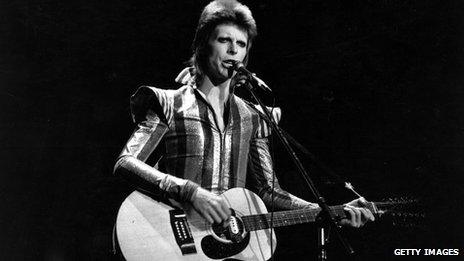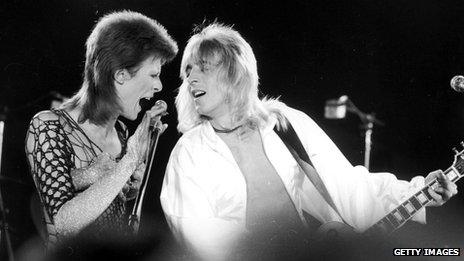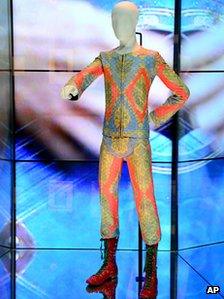David Bowie: Did he change attitudes to sexuality?
- Published

Bowie revelled in the androgyny of his creation Ziggy Stardust
The new David Bowie exhibition at the Victoria & Albert Museum was already a hot ticket even before the show opens to the public this weekend. "David Bowie is" shows how, in the 1970s, David Bowie's passport to fame was his daringly ambiguous sexuality. But did appearances deceive?
These days Dylan Jones is editor of British GQ magazine and very accustomed to living the high-life. But in July 1972 he was an ordinary 12-year-old living with his parents in an ordinary part of Kent. Then one evening, his life changed.
"I can picture the exact moment: my father was away and my mother was out in the garden," he says. "So I was alone in a terrace house in Deal watching Top of the Pops.
"Normally it would have been a forgettable Thursday but I was about to be astounded. It was the first time we were exposed to Ziggy Stardust in all his androgynous glory.
Bowie, with flaming red hair and a skin-tight body-suit, played the song Starman, external. Last year, Dylan Jones published a book arguing that this remains a crucial moment in cultural history - When Ziggy Played Guitar: David Bowie and Four Minutes that Shook the World. Wasn't the book's premise a little overstated?
"Absolutely not," he insists. "In those days Top of the Pops could easily be watched by 14 million people, so the next day Bowie was all anyone was talking about.
"It's not like hundreds of thousands of people all claiming to have seen the Sex Pistols live when they started out: Bowie genuinely did become common currency overnight.
"He was a dangerous figure on British TV at a point when television didn't do danger.
"41 years ago, it was an extraordinary experience. It didn't immediately fill me with gay longings - though with some people it did. But nothing was quite the same afterwards.
Someone else fascinated by Bowie that evening was Rupert Smith, now known as a novelist and critic.
"I was a gay 12 year-old just starting to take an interest in pop music and I was knocked out," he says. "I was watching with my mother who said, Oh he looks like Glenda Jackson playing Elizabeth I - which in retrospect was quite perceptive.
"And then came the famous moment on the show when David Bowie slung his arm around guitarist Mick Ronson - which was simultaneously blokey but also a bit gay. It may not sound like much now but in 1972 it was a revolution."

Stardust was one of Bowie's many characters, which also included the Thin White Duke of the mid 1970s
Even as a teenager, Smith spotted one big difference between Bowie and other '70s performers who appeared to flirt with sexual ambiguity, such as Marc Bolan.
"A few months before the TOTP appearance, Bowie said on the record in the Melody Maker that he was gay - or at least bisexual. (The interview with Michael Watts appeared on 22 January 1972.)
Looking back now, the statement was ambiguous but at the time it was a brave thing to say - it was only five years since homosexual acts had been legalised in Britain.
"I didn't find David Bowie at all attractive in any physical way. But I loved what he stood for."
Paul Trynka, a recent Bowie biographer, thinks the singer was revealing the genius for remaking his image which the world would see again and again.
"In 1972, there wasn't the huge media proliferation we have today. That early statement to the music press had barely been picked up by mainstream newspapers.
"So TV appearances on TOTP, the Old Grey Whistle Test and even on a news programme like Nationwide became a tipping point. He brought the outrageous into the mainstream.
"We don't know exactly what was happening in his own life - by 1972 he'd been married two years - although certainly he's of a generation which was more relaxed about experimentation.
"But David was aware of a British fondness for camp which goes all the way back to music hall. His theatricality didn't come from nowhere."

Bowie's costumes are on show at the V&A Museum in London
Rupert Smith says it would be wrong to be cynical about Bowie's manifestations of sexual ambiguity in the 1970s. "Perhaps it was partly for show but ultimately I don't think it matters what he was doing in his private life. He's always been an actor.
"He clearly knew his way around gay culture in terms of its writing and music and visual art.
"More than anyone else, he blasted the closet-door off its hinges. So for that I'll always love him - but his position on the politics of sexuality is a conflicted one. If, like me, you're a big Bowie fan you just have to accept that.
"At the very least in the '70s he was a pioneer of sexual openness in Britain. It was a long time before anyone came along in music who was unambiguously gay. Arguably in Britain, that title goes to Jimmy Somerville but Bowie paved the way."
Dylan Jones says we all owe the 25-year-old Bowie a debt: "Much of '70s Britain was drab and colourless. He offered us excitement."
But Jones also warns against cultural false memory syndrome.
"When I was writing my book about Bowie, I was lovingly recounting to my father my memories of that day in 1972: Bowie's bright red hair contrasting with the pallid skin and the incredibly colourful body-suit which, of course, I could recall in absolute detail.
"My father listened and when I finished, he quietly pointed out that in 1972 we only had a black and white TV set."
Jones thinks for a moment. "Or maybe that just proves Bowie's talent: he was massively exciting even in monochrome."